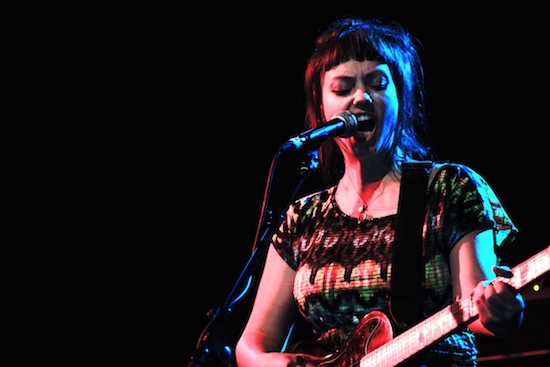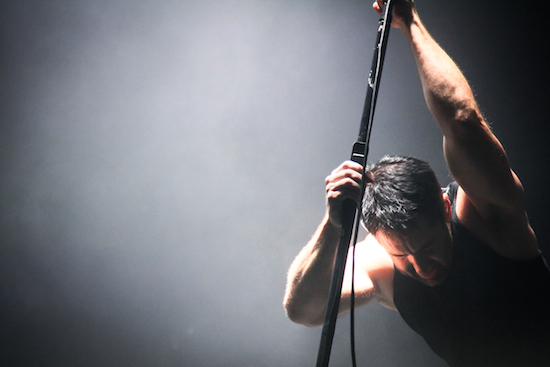I’ve lived in Barcelona for five years, and for all but one of those I’ve attended Primavera Sound. Nestled on the outskirts of what is a beautiful, storied city with views taking in the Mediterranean Sea to the south and the Serra de Collserola to the north, the festival has expanded considerably in size and reputation over the last 14 years – to the point where it is often mooted the best of its kind in the world – yet it retains the atmosphere of a very special event.
That is primarily down to its line-up, which consistently draws big names yet, in a display of solidarity, is presented alphabetically. What’s more, despite being rooted in the indie-rock world, every year some of the most exciting breaking acts from across a spectrum of genres feature on the bill, not to mention a raft of the most interesting established concerns.
Catalonia is producing some brilliantly diverse music at the moment
The first act I see this year is Joan Pons, a local singer who performs under the name El Petit De Cal Aril. Backed by a grinning group of musicians and a brass trio on the Ray Ban amphitheatre stage, the soft psychedelia and folk that he’s gained a name for here takes on such added heft that a song like ‘Amb Tot’ (‘With Everyone’) sounds not just sweet and endearing but honestly stirring, complete with a singalong brass hook.
Moments later, on the Pitchfork stage, I catch the tail end of a Wind Atlas show that belies the fact that the group formed just a year and a half ago in Barcelona. A dark, brooding prospect that have garnered comparisons with the likes of Cocteau Twins, Andrea Pérez’s spectral vocals and oddly magnetic presence bolsters their droning, minimal sound. Meanwhile, El Último Vecino – a project spearheaded by local musician Gerard Alegre Dòria – make a deep impression on the Vice stage next door: a riot of New Wave synth and guitar that coaxes unexpectedly light and infectious melodies out of some surly, angular songs.
Across the festival, both in the main event at the Parc del Fòrum and in the various shows taking place in the city, myriad acts – from the more established likes of John Talabot, Standstill, Manel and Anímic to Joanna Serrat, Súper Gegant and the utterly insane, brilliant Za! all appear, and all back up the notion that there is a whole lot of music to be excited about coming out of Catalonia at the moment.
Arcade Fire bring the party, and it’s magnificent
"Did you see Arcade Fire?" a young Spanish couple I meet a few hours after their set giddily ask me. Anita, whose bag I had just returned to her from a precarious spot on a bench, smiles beatifically. "They were awful," she tells me, to my puzzlement. "They were, so, awful," she continues, lost in blissful reverie.
"You guys didn’t like them?" I venture, and we soon realise that "awesome" is the adjective Anita was looking for. And she’s right: Arcade Fire, returning to Primavera Sound for the first time since 2005’s Funeral tour, are awesome, and their set seems to be just about all anyone can talk about on the first night of the main event.
The performances put in by Win Butler and a perma-smiling Régine Chassagne are something to behold; the last time I saw the band play a festival was at a drizzly Glastonbury during the Neon Bible cycle, and the contrast couldn’t be more pronounced. The songs from Reflektor come alive onstage in an delirious frenzy of carnival rhythms and good feeling, the energy the band draw from them fuels the entire show. A glitter storm erupts during ‘Here Comes The Night Time’ and a seismic ‘Wake Up’ follows to see them out, its wordless refrain echoing back onto the Sony stage by what seems like the largest crowd of the entire festival.
John Grant brings the rain, and it’s also pretty magnificent
I’ve never quite fallen for John Grant the way many others have, but I arrive at the festival site on Friday afternoon with high hopes that it will all come together. Grant takes to the Heineken stage as a long-touted storm rumbles and swells above the city skyline behind him, and not a few songs into his set the almighty squall wreaks havoc on the Parc del Fòrum site. Many flee, but those who stay are rewarded with a show that balances the often bitter sentiments expressed via song with his genuine delight at playing the festival (which is related to the audience in some more than passable Spanish). The stylistic differences between 2010’s Queen Of Denmark and last year’s Pale Green Ghosts are barely discernible, as for all the class of the musicianship surrounding him, it’s very difficult to focus on anything other from Grant’s voice when watching him play – a richer, warmer instrument live than it comes off on record.
A closing run through ‘Queen Of Denmark’ is funny, powerful and a little heartbreaking all at once, Grant crooning at the piano as the band clatter and spark into life around him. The crowd response is rhapsodic, a fitting grace note to a performance that sees him gather more than one enthusiastic new convert.

Heartache and loneliness are being beautifully wrought this year
"It’s hard to play a sad song when you’re happy, and it’s hard to play a happy song when you’re sad," chuckles Angel Olsen, to the packed crowd inside the BARTS theatre on Sunday night. Her show is outstanding, and one that underlines the strength of Olsen’s exceptionally versatile voice. Whether crooning or whispering sharp lyrical barbs, she holds her audience rapt, and a set list that draws from this year’s breakout Burn Your Fire For No Witness and her equally brilliant 2012 offering Half Way Home is something very fine indeed.
She rounds out the night in soft spotlight, with solo performances of ‘Iota’ and ‘White Fire’. The latter, a funereal seven minutes of personal reflection, is breathtaking: a moment to cherish. It strikes me as she plays it that, from Slint to Godspeed to Neutral Milk Hotel to Nine Inch Nails, even, that I can’t remember the last time, if ever, I’ve seen so many crowds at a festival so reverent, so entranced.
Something similar occurs when Sharon Van Etten – another singer appearing off the back of an album that deals with some painfully honest themes – offers a stunning solo take on ‘I Know’. In a set that leans heavily on Are We There, she and her band play with relish and conviction: from the gentle opening swell of ‘Afraid Of Nothing’ through a swaggering ‘Tarifa’, and later, to close, a blistering one-two of ‘Serpents’ and ‘Your Love Is Killing Me’ followed by ‘Every Time The Sun Comes Up’.
Slint are unexpectedly devastating
When I say "unexpectedly", I don’t mean that I didn’t expect Slint to be brilliant; indeed, as one of the bands I was most looking forward to seeing, I had hoped that they would be. But halfway through their set, standing on my own in the crowd, I’m brought close to tears.
I grew up in Exmouth, a fairly average town on the south coast of Devon, where my friends and I started playing in bands at around the age of 13. There were a few independent record shops around, but by far the best one was called Onionheart, and we started calling in regularly with some older friends of ours at that time. Mike, the owner, was a deeply knowledgeable man who loved nothing more than to talk at length about music (and try to lure our impressionable minds away from whatever Britpop names we were scrawling into our exercise books at the time).
Slint’s Spiderland was one of many records he introduced me to, and I remember not quite understanding it at first; this odd, six-song album with barely any artwork by a band I had never read about anywhere and a CD it was very difficult to tell you had the right way up. Sure enough, I was soon enamoured with the group, though it wasn’t until I was at home a few weeks ago that I fished out my copy of the album for the first time in years.
So, when Slint silence the crowd assembled at the ATP stage on Friday evening with a set every bit as powerful and exhilarating as I’d hoped, I’m forcibly thrust back into my teenage years. The show is equal parts crushing and intimate, but when Brian McMahon and David Pajo follow a perfect take on ‘Washer’ by sitting down and playing ‘Don, Aman’ together, that intimacy becomes almost painful for me.
A lot of things make the show so devastating, but primarily the comprehension that just as my early 20s are now a fair way behind me, so being a teenager is locked even further in the recesses of the past. I’m lucky enough to have had a fairly idyllic adolescence, and passing an afternoon propped up on the counter of a now non-existent record store before heading off to a band practice or a hopeful round of the off-licenses formed a big part of that. That was all of 15 years or more ago, in a town that has lost not only its premier independent record store, but seen the departure of a university campus and the changing of hands of my beloved local to boot. Here, I just about hold it together as the band finish with ‘Good Morning, Captain’.

Nine Inch Nails are unexpectedly uplifting
Nine Inch Nails are one of those bands who, a few listens to their most vaunted works aside, I’d never paid a great deal of attention to. Yet, on Saturday night – the closing day of the main event in the Parc del Fòrum, which seems slightly sparser in attendance than the previous two – I still find myself keen to see what Trent Reznor and his men are about to offer a sizeable crowd at the Sony stage.
And what they have to offer is something incredibly impressive: a cacophony of tribal beats, glistening electric guitars and the inimitable presence of Reznor himself, all cloaked in a light show that oscillates between warm orange-yellow glows, icy blues and cold, hard whites in spectacular fashion. The band charge through an intense, career-spanning set, barely pausing for breath until the end, when a superlative ‘Hurt’ closes the show in towers of emotional catharsis, and NIN make an unlikely case for being one of the most uplifting things I’ve seen out of the whole, stellar line-up.


